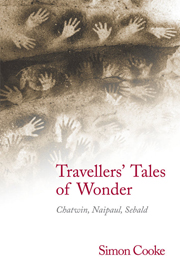Book contents
- Frontmatter
- Contents
- List of Illustrations
- Acknowledgements
- Introduction: The Wonder that Came Later
- I ‘Horizon of expectations’: Travels in Literary History
- 1 A Question of Form: Genre and the Journey
- 2 ‘An End to Journeying’: Travel and its Discontents in Late Modernity
- 3 Forms of Recovery and Renewal: Travels in Contemporary Literature
- II Readings in Contemporary Travellers' Tales of Wonder
- Afterword: The ‘unlimited vicissitudes of travelling’
- Bibliography
- Index
2 - ‘An End to Journeying’: Travel and its Discontents in Late Modernity
from I - ‘Horizon of expectations’: Travels in Literary History
Published online by Cambridge University Press: 05 October 2013
- Frontmatter
- Contents
- List of Illustrations
- Acknowledgements
- Introduction: The Wonder that Came Later
- I ‘Horizon of expectations’: Travels in Literary History
- 1 A Question of Form: Genre and the Journey
- 2 ‘An End to Journeying’: Travel and its Discontents in Late Modernity
- 3 Forms of Recovery and Renewal: Travels in Contemporary Literature
- II Readings in Contemporary Travellers' Tales of Wonder
- Afterword: The ‘unlimited vicissitudes of travelling’
- Bibliography
- Index
Summary
‘An End to Journeying’: thus the often-cited, era-defining title – part injunction, part lament – of the first part of Claude Lévi-Strauss' Tristes tropiques, his seminal anthropological memoir (and, indeed, travel account) of his years in South America. First published in 1955, it was translated from French into English by John Russell in 1961 with the substantially inaccurate, and thus all the more telling, title of A World on the Wane. The combative, exasperated, self-chastising opening sentences – ‘I hate travelling and explorers. Yet here I am proposing to tell the story of my expeditions’ (Lévi-Strauss 1976: 15) – launches an invective of superb disdain against the ‘vogue’ for a kind of travel book in which ‘platitudes and commonplaces seem to have been miraculously transmuted into revelations by the sole fact that their author, instead of doing his plagiarizing at home, has supposedly sanctified it by covering some twenty thousand miles’ (1976: 16). The distancing critique is in part the anxiety that ‘the truths’ anthropologists seek ‘only become valid when they have been separated from this dross’ (1976: 15). But it gradually gives way to the singularly eloquent yet broadly representative tristesse of travel and its discontents in late modernity. ‘Journeys,’ Lévi-Strauss writes, ‘those magic caskets full of dreamlike promises,’
will never again yield up their treasures untarnished. A proliferating and overexcited civilization has broken the silence of the seas once and for all. The perfumes of the tropics and the pristine freshness of human beings have been corrupted by a busyness with dubious implications, which mortifies our desires and dooms us to acquire only contaminated memories. (1976: 43)
- Type
- Chapter
- Information
- Travellers' Tales of WonderChatwin, Naipaul, Sebald, pp. 23 - 44Publisher: Edinburgh University PressPrint publication year: 2013

